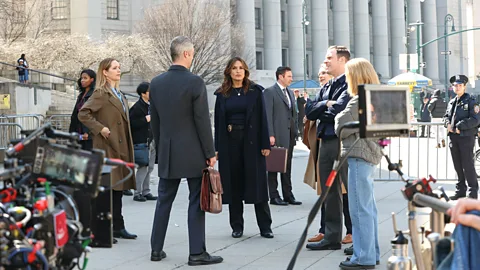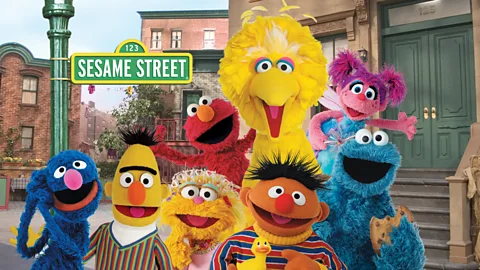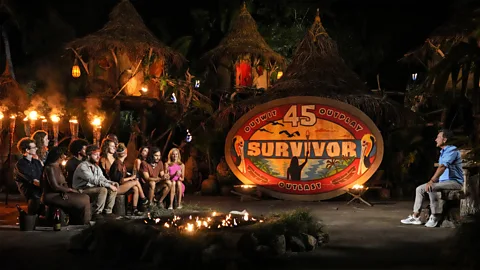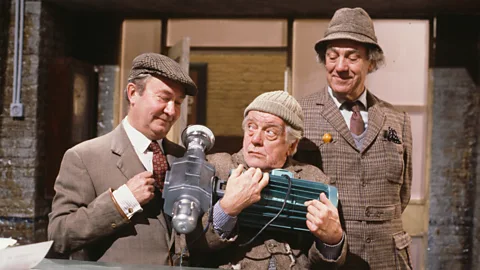The longest-running TV series in every category - from soaps to sitcoms
 Getty Images
Getty ImagesEvolution, fan comfort and a little TV magic have given these longest-running TV series staying power – sometimes for decades.
In 2024, there is no shortage of television programming to choose from. But quality series – those that have managed to captivate audiences season after season – are harder to come by.
While certain TV series have been hits with audiences and critics alike only to be cancelled after one or a handful of seasons, (from My So-Called Life and Freaks and Geeks to Mindhunter), others just keep coming back. ABC's medical drama Grey's Anatomy is embarking on its 20th season, and the animated series Family Guy was renewed for its 23rd, appearing on Fox since 1999.
There's no exact formula for television longevity. Still, sticking around for decades means a show can reach millions of viewers not just at one time, but from one generation to another – a marker of a story and characters that truly resonate.
Here are some of TV's longest-lasting shows that have managed to do just that.
 Sesame Workshop
Sesame WorkshopAnimated comedy: The Simpsons, 34 seasons
The Simpsons is one of the longest-running series in TV history. It began in 1987 as a short sketch on the Tracey Ullman Show before entering syndication two years later. And after an impressive 34 seasons, it's still being produced today. Few series have ever offered the kind of funny and cunning cultural critiques as The Simpsons – in fact, its writers have often been so spot-on with their commentary on current events, they've been credited with predicting them.
South Park, which is slightly more political (and way less PG) than The Simpsons, seems to operate similarly. While it doesn't have quite as many seasons as Bart and family, the never-ageing trash-mouthed eight-year-olds of Southpark have been going strong on Comedy Central for 27 seasons and counting, still amassing plenty of viewers.
Children's television: Sesame Street, 54 seasons
We may not be able to tell you how to get to Sesame Street, but we can point you to the right channel: after 54 years, the programme still airs on PBS in the United States. Given that Sesame Street continues to educate children on the ABCs and kindness, while also featuring some of the most famous celebrities of any given era – from Robin Williams to Destiny's Child – it has good reason to keep going another half century.
Late night: The Tonight Show, 70 seasons
Late-night programming lends itself to cultural commentary like no other type of television. Perhaps that's why plenty of late-night shows, such as the sketch comedy series Saturday Night Live (now in its 49th season) and The Late Late Show (29 seasons) have stood the test of time. None, however, have lasted quite as long as The Tonight Show, which has seen six comedian hosts: Steve Allen, Jack Paar, Johnny Carson, Jay Leno, Conan O'Brien and the current host, Jimmy Fallon.
More like this:
– Is the mediocre romcom making a grand return?
 Getty Images
Getty ImagesSoap Opera: Coronation Street, 64 seasons
Not all long-running shows have to be snarky, comedic or discuss current events – some just bring the drama. That's the case for Coronation Street, which holds the title of longest-running soap opera in American television. The soap is now in its 64th year of production. Following closely behind is General Hospital, which is in its 61st year, and has earned 14 Daytime Emmys for outstanding drama series. Other soaps that are right behind GH include Guiding Light and Days of Our Lives, which have both been staples of daytime TV for 57 years.
Sitcom: Last of the Summer Wine, 31 seasons
The longest-running sitcom award goes to the BBC's Last of the Summer Wine, a comedy that ran for 31 seasons and ended in 2010. In the US, it's the dark and often raunchy comedy It's Always Sunny in Philadelphia, which debuted in 2005 and has run for 16 seasons and counting. While it has managed to shock audiences, it hasn't managed to turn them off: the series, starring Rob McElhenney, Charlie Day, Glenn Howerton, Kaitlin Olson and Danny DeVito, is still in production. You can watch all 16 seasons of the comedy programme on Hulu, and the 17th season is expected to drop later this year.
Drama: Law and Order, 23 seasons
The crime drama Law and Order premiered in 1990 and has been running ever since. In fact, the series, created by Dick Wolf, has only grown: it spurred an entire franchise that includes the flagship show, Law & Order: SVU as well as Law & Order: Organized Crime. While there have been many other dramas that lasted for more than a decade, such as the aforementioned Grey's Anatomy, Law & Order's 23 seasons plus multiple spin-offs demonstrate the true grip it has on viewers.
Reality TV: Survivor, 46 seasons
An American Family, a 12-episode PBS series that filmed an average middle-America family, is credited as being the first reality series ever. Next, series such as MTV's The Real World took the reality TV concept to the next level by putting strangers in a house with cameras and no script. The phenomenon proved fascinating to audiences, and The Real World became one of the longest-running reality shows, with 33 seasons and incarnations.
Since then, there have been countless reality shows with every possible theme: competitions in cooking, sport or fashion, dating shows from Love Island to Love on the Spectrum, and more. And many of them stick around. The Amazing Race, still in production, is in its 35th season. The Bachelor has been in production for 28 seasons. But no other reality TV show (so far) has lasted as long as Survivor. The wilderness-themed competition show is in its 46th season, and it's doing more than just surviving – it's still raking in viewers.
 Getty Images
Getty ImagesHow do some shows manage to keep going?
Captivating audiences for years, or even decades, is no easy feat, and it's almost impossible to accurately predict if a series will last. But looking at those that have seriously withstood the test of time, it's clear that one marker of longevity is the ability to evolve and offer something fresh throughout the ages.
Journalist John Ortved wrote about the longevity of The Simpsons in his book, The Simpsons: An Uncensored, Unauthorized History. He tells BBC Culture that one reason the animated show has stayed on for so long is because, being animated, it has a lot of creative freedom: its characters don't age so it can be perpetually set in the present day. This means the series can speak to issues of modern times, whatever those times may be today – something the Simpsons has often done rather fearlessly.
"Comedy moves on," Ortved said. "It morphs." It does that, he explained, because it needs to in order to stay relevant. Ortved says it's impossible to talk about the success of The Simpsons without mentioning the brilliant writers who have supplied its cutting commentary for decades.
Still, while the themes evolve with the ages, there's something about the comfort of unchanging elements of sitcoms that is also appealing. "It doesn't matter if they give Bart an iPhone or Lisa's doing something on social media,'' Ortved said. "At the end of the day (and at the beginning of the show), you're always back in the same place, with the same people, in the same town." That sense of comfort is crucial for drawing viewers back to watching it, again and again.
Of course, unchanging characters is something only animated shows can accomplish over decades. Reality TV series, on the other hand, can stay fresh because they bring in a new cast every season. But reality star Jamie Otis, who starred in the very first season of Married At First Sight – now in its 17th season – tells BBC Culture that these kinds of shows last because they actually accomplish what they're supposed to do: help people find love.
"When it works, it works well, and it’s a beautiful love story," she said. "It’s so amazing to follow the successful couples and watch them do life together even after their season ends."
Otis, who has now been with her husband Doug, whom she met on the show, for 10 years and is expecting twins, says she's grateful that, for her, it actually worked. But even when it doesn't, she says, reality TV is very good at holding audiences captive.
Across genres, what keeps viewers coming back can differ greatly, from the high-key drama of a soap opera to the comfort of Bart and Lisa's unchanging faces to the latest cast of young and beautiful reality TV stars crying over not getting a rose. But good cultural commentary, drama, love and comedy will always be things that viewers want more of.
"Whether Shakespearean or cinematic," Ortved said, "if you can harness those universal themes, then you really have something profound." Profound and, most likely, long-lasting.
If you liked this story, sign up for The Essential List newsletter – a handpicked selection of features, videos and can't-miss news delivered to your inbox every Friday.
If you would like to comment on this story or anything else you have seen on BBC Culture, head over to our Facebook page or message us on Twitter.
